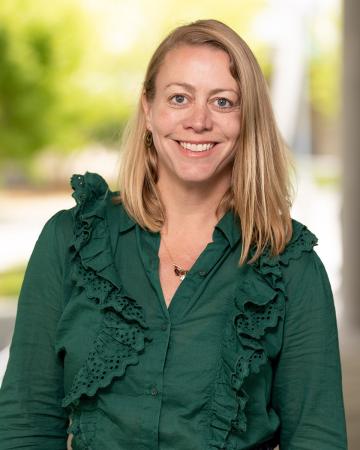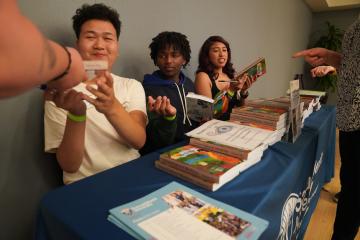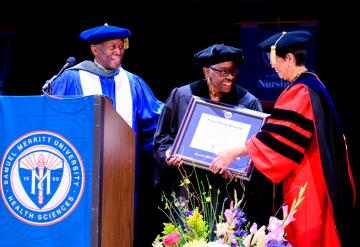Mohammad Deen: Humanitarian Worker and Future Certified Registered Nurse Anesthetist
This story is one of a series titled "Profiles of Passion," which features incoming SMU students who have demonstrated their dedication to transforming healthcare in their communities and the world even before their first day of classes. Click here for other stories in the series.
The recent photo of a young boy covered in dust and blood after he was rescued from a bombed-out building in Aleppo reminded Mohammad Deen of last year’s heartbreaking image of another victim of the Syrian civil war. Like so many people around the world, Deen was shocked and saddened by the photo of a dead toddler’s body in a red shirt, blue shorts and sneakers lying facedown in the sand on a Turkish beach.
That picture spread quickly via social media, stirring public outrage about the desperate plight of Syrian refugees fleeing war. Despite Deen’s hope that the photo would shake the world into action, the refugee crisis only grew worse and the 27-year-old says he could no longer sit back and watch the news.
In April, Deen gave up a nursing job to travel to Greece, where he worked for almost three months in a Syrian refugee camp near the Macedonia border. He helped run a nighttime clinic with other volunteers out of two ambulances in a camp located at a former gas station— an experience he chronicled on his Instagram page to raise awareness of the crisis.
“I want more Americans to know what’s going on,” says Deen of the staggering toll of the Syrian civil war. “A half a million people have been killed, hospitals are being  bombed, and no one is saying anything.”
bombed, and no one is saying anything.”
Deen says it was difficult to leave the camp, but he had a larger goal in mind. He is about to begin full-time study at Samuel Merritt University (SMU) to become a Certified Registered Nurse Anesthetist, a career that he says will give him the resources and expertise to start a traveling medical/surgical team that will provide disaster relief and help prevent blindness in developing countries.
“I want to show people that you can go from nothing to become someone who is helping a lot of people,” he says.
Deen was born in Chicago to parents of Palestinian origin. When he was 6, his family visited his grandmother in an impoverished village near Ramallah on the West Bank and he was so enthralled with the place that he begged his parents to let him stay.
When he returned to Chicago nine years later, his parents were struggling financially so Deen worked several jobs while attending high school, sometimes sleeping in a parking lot in between and watching his grades plummet.
At 19, he took a job as an Arabic translator at a medical center, working primarily with wealthy patients from Saudi Arabia and Kuwait. While he was paid well, Deen said he hated everything about the medical field.
“I didn’t like the hospital smell or having to tell the family of a 6-year-old that he had cancer,” says Deen.
That all changed one day when an Egyptian family arrived with their very sick daughter and Deen was assigned to help them communicate with the doctors. The mother tearfully shared with Deen how her three sons died unable to receive medical care because the family had no money.
After the daughter survived cardiac surgery, her mother reached into her purse and handed Deen a package of wafers. He says he’ll never forget her telling him: “I’m so embarrassed this is all I have to give you. Please make me a promise that you’ll help other people in my situation who have lost everything.”
Deen has been trying to fulfill that promise ever since. As a critical care registered nurse, he went to Greece with the intention of helping with medical emergencies among the refugees suffering from post-traumatic stress disorder, amputations caused by barrel bombs and other conditions made worse by their difficult journey.
A friend persuaded him to post photos and videos of life inside the refugee camp on his social media accounts and, to his surprise, donations began pouring in from his friends and their friends. One video alone raised $10,000 in two days, he says, and a simple photo of him holding a sign that read “Aleppo is burning” in English and Arabic resulted in thousands of shares and friend requests on Facebook.
“Pictures can tell a thousand words,” he says.
Deen soon realized that the refugees needed much more than medical care. He used the donations to buy them fresh food, bug repellent to ward off the mosquitoes, and sunscreen and caps for the kids so they wouldn’t get sunburned. He says he secured vitamin supplements for the many malnourished children and medications for the adults with chronic illnesses.
The grateful refugees responded by inviting Deen into their tents to share the little they had such as coffee, tea and freshly baked Arabic flatbread. When he gathered the children in a big tent to teach them English, some of the children would offer him half of the daily apple they received.
“It is always the people who have nothing who will give you everything,” says Deen, who avoids using the term “refugees” because he believes it strips them of their humanity.
While he will have to take a break from his charitable work to attend SMU, the Syrian crisis is never far from his mind and he plans to return during the holiday break in December.
“Children are the biggest victims of war in my opinion,” Deen wrote on Instagram to accompany a photo of himself with the camp’s kids. “Over 3.7 million children were born into the conflict that is happening in Syria till this day. Thousands have died in between. You try to do the best you can to make them forget about the horror they have seen.”


